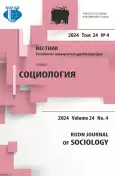Sociological portrait of the higher bureaucracy in Russia
- Авторлар: Borshchevskiy G.A.1
-
Мекемелер:
- Russian Presidential Academy of National Economy and Public Administration
- Шығарылым: Том 24, № 4 (2024)
- Беттер: 1068-1083
- Бөлім: Contemporary society: the urgent issues and prospects for development
- URL: https://journal-vniispk.ru/2313-2272/article/view/323176
- DOI: https://doi.org/10.22363/2313-2272-2024-24-4-1068-1083
- EDN: https://elibrary.ru/PTIRUV
- ID: 323176
Дәйексөз келтіру
Толық мәтін
Аннотация
The article considers the sociological aspects of the senior bureaucrats’ appointment in the Russian federal ministries in recent five years. The study aims at identifying the prevailing recruitment model and at assessing the efficiency of policies, the necessity of which is determined by the high influence of bureaucracy in the Russian society and by the negative reputation of the civil service. The theoretical framework of the study consists of the theories of bureaucracy by Max Weber, Karl Marx, and Michel Crozier. The predictor variables describe personal characteristics of senior executives and the mode of their recruitment. The author tested two hypotheses about the predominance of one of two higher bureaucrats’ recruitment models: patrimonial (political, patronage) or meritorious; the second model seems to prevail. Based on the Russian dataset, the author also examined the connection between the recruitment model of senior bureaucrats and the efficiency of ministries in implementing government programs, information openness and contribution to the national economic growth. In all three cases, ministries headed primarily by career (meritorious) bureaucrats turned out to be more effective. The primary data on 381 senior civil servants’ biographies obtained was collected from the personal pages of official ministerial websites with the method of content analysis. The data on the ministries’ efficiency was collected from the annual ministry reports, public indices of informational openness, reports about the state programs implementation, and economic input of each ministry in the sectoral GDP. Quantitative methods such as regression analysis and statistical analysis were used to interpret the data. The author concludes that the Russian system of governance needs a special body to administer its higher bureaucracy (recruitment, remuneration, payment, retirement, etc.) structurally resembling the senior civil service in the OECD countries.
Негізгі сөздер
Авторлар туралы
G. Borshchevskiy
Russian Presidential Academy of National Economy and Public Administration
Хат алмасуға жауапты Автор.
Email: borshchevskiy-ga@ranepa.ru
доктор политических наук, профессор кафедры политологии и политического управления Института общественных наук Vernadskogo av., 82, Moscow, 119571, Russia
Әдебиет тізімі
- Belloir A., van den Berg C. Functional politicization in the Dutch senior civil service: Evidence from longitudinal surveys and qualitative research (2007–2019). Journal of Public Administration and Policy. 2020; 13 (2).
- Besley T.J., Burgess R., Khan A., Xu G. Bureaucracy and development. Annual Review of Economics. 2022; 14.
- Cornell A., Knutsen C.H., Teorell J. Bureaucracy and growth. Comparative Political Studies. 2020; 53 (14).
- Ebinger F., Veit S., Fromm N. The partisan-professional dichotomy revisited: Politicization and decision‐making of senior civil servants. Public Administration. 2019; 97 (4).
- Ennser-Jedenastik L. The party politicization of administrative elites in the Netherlands. Acta Politica. 2016; 51 (4).
- Evans P., Rauch J.E. Bureaucracy and growth: A cross-national analysis of the effects of “Weberian” state structures on economic growth. American Sociological Review. 1999; 64.
- Fortescue S. Russia’s civil service: Professional or patrimonial? Executive-level officials in five federal ministries. Post-Soviet Affairs. 2020; 36 (4).
- Gally N. Senior bureaucrats across organizations, professions and politicians. A comparative sociology of administrative labor markets. Revue francaise de science politique. 2020; 70 (1).
- Garifullina G. The best among the connected (men): Promotion in the Russian state apparatus. Post-Soviet Affairs. 2023; 39 (5).
- Gilmour J.B., Lewis D.E. Political appointees and the competence of federal program management. American Politics Research. 2006; 34 (1).
- Hood C., Lodge M. The Politics of Public Service Bargains: Reward, Competency, Loyalty — and Blame. Oxford; 2006.
- Kolesnik N. “Fragile representation” or women in big politics: The case of the administrative elite. RUDN Journal of Political Science. 2022; 24 (1).
- Kryshtanovskaya O., White S. From Soviet nomenklatura to the Russian Elite. S. White, D. Nelson (Eds.). The Politics of the Post-Communist World. London; 2019.
- Lowe R., Pemberton H. The Thatcher and major revolutions, 1982–97. The Official History of the British Civil Service: Reforming the Civil Service. London; 2020.
- Makarenko V.P. On the development of a theory of Russian bureaucracy. Russian Studies in Philosophy. 2022; 60 (5).
- McDonnell E.M. Patchwork Leviathan: Pockets of Bureaucratic Effectiveness in Developing States. Princeton; 2020.
- Owen C. Participatory authoritarianism: From bureaucratic transformation to civic participation in Russia and China. Review of International Studies. 2020; 46 (4).
- Peters B.G., Pierre J. Populism and public administration: Confronting the administrative state. Administration & Society. 2019; 51 (10).
- Silitonga M.S., Van Duijn M.A.J., Heyse L., Wittek R. Setting a good example? The effect of leader and peer behavior on corruption among Indonesian senior civil servants. Public Administration Review. 2019; 79 (4).
- Staronova K., Rybář M. Personal or party roots of civil service patronage? Ministerial change effects on the appointments of top civil servants. Administration & Society. 2021; 53 (5).
- Tev D.V. Federal administrative elite of Russia: Career paths and channels of recruitment. Political Studies. 2016; (4). (In Russ.).
- Vaskin I.A. Recruitment of elites to the cabinets of Iran: A biographical analysis (1979–1989). East. 2023; (1). (In Russ.).
- Zulkarnain Z.P., Prasojo E. Understanding Japan’s civil service system: Norms, meritocracy, and institutional change. Policy & Governance Review. 2020; 5 (1).
Қосымша файлдар









